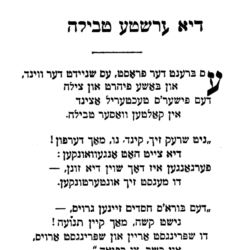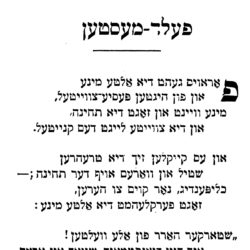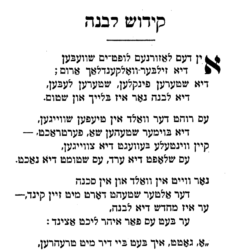| Source (Yiddish) | 1902 Translation, Berthold Feiwel (German) | 1914 Translation, Rose P. Stokes & Helena Frank (English) | 1921 Translation, Helena Frank (English) |
|---|---|---|---|
דיא חנוכה ליכט |
Ḥanukkah⸗Lichter[1] Das Ḥanukkahfest wird zur Erinnerung an die Makkabäer, die größten júdischen Nationalhelden, gefeiert. An diesem Feste werden allabendlich kleine Lichter entzündet. (The Ḥanukkah festival is celebrated in memory of the Maccabees, the greatest Jewish national heroes. On this festival, small lights are lit every evening.) |
The Feast of Lights |
Ḥanukkah Lights |
א, איהר קלײנע ליכטעלאַך! איהר דערצעהלט געשיכטעלאַך, מעשה׳לאַך אָהן צאָהל, איהר דערצעהלט פון בּלוטיגקײט בּריה׳שאַפט און מוטהיגקײט, װאונדער פון אַמאָל. |
O, ihr lieben Lichtelein, Euer freundlich-stiler Schein Spricht gar mancherlei. Spricht von kühnem Heldenmut, Kampf und Tod und Heldenblut, — Wunder längst vorbei! |
Little candles glistening, Telling all those listening Legends manifold. Many a little story, Tales of blood and glory, Of the days of old. |
Little candles glistening, Telling all those listening Legends manifold. Many a little story, Tales of blood and glory, Of the days of old. |
װען איך זעה אײך שמינקלענדיג, קומט אַ חלום פינקלענדיג; רעדט אײן אלטער טרוים׃ ״איד, דוא האָסט געקריעגט אַמאָל, איד, דוא האָסט געזיעגט אַמאָל״ גאָט, דאָס גלויבּט זיך קוים!…. |
Sieh! Bei eurem flimmernden Schein Tritt ein Traum, ein schimmernder, ein, Und der Traum erzählt: Jude, warst ein Krieger einst, Jude, warst ein Sieger einst, Stolz und kraftgestählt! |
As I watch you flicker, As I list you bicker, Speak the ancient dreams: –You have battled, Jew, one time, You have conquer’d too, one time. (God, how strange it seems!) |
As I watch you flicker, As I list you bicker, Speak the ancient dreams: “Jew, you also took the field, Jew, you made the foeman yield.” God, how strange it seems! |
ס׳איז בּײ דיר א טאלק געװען, ביסט אַמאָל אַ פאָלק געװען, האָסט אַמאָל רעגיערט: האָסט אַמאָל אַ לאַנד געהאַט, האָסט אַמאָל אַ האַנד געהאַט!״ אַך, װיא טיעף דאָס ריהרט! |
Auserwählt war dein Geschlecht, Hattest dein Gebot, dein Recht, Lebtest groß und frei, Hattest einst ein eigen Land, Herrschtest drin mit starker Hand, — Wunder längst vorbei! |
In your midst was order once, And within your border once Strangers took no part. Jew, you had a land one time, And an armed hand, one time. (How it moves the heart!) |
Once you knew on what you stood, Wore the crown of nationhood, Ruled among the rest. “Jew, you had a land, one time, And an armed hand, one time—” How it stirs the breast! |
אָ, איהר קלײנע ליכטעלאַך! אײערע געשיכטעלאַך װעקען אויף מײן פּײן; טיעף אין הערץ בּעװעגט עס זיך, און מיט טרעהרען פרעגט עס זיך: װאָס װעט איטצטער זײן?…. |
O, ihr lieben Lichtelein, Euer freundlich-stiller Schein Weckt den alten Schmerz: Einst und jeßt! So klage ich, Einst und jezt! So frag’ ih mich, Und es weint mein Herz. |
Glisten, candles, glisten! As I stand and listen All the grief in me, All the woe is stirred again, And the question heard again: What the end shall be? |
Little flickering glories, All your little stories Wake the sleeping pain. In my heart it stirred and cried, Asks, and will not be denied: “Shall this be again?” |
* * * | |||
ניט אײבּיג זיינען מיר, װיא היינט, געװען א פאָלק, װאָס קען נאָר קלאָגען; מיר האָבּען אויך אַמאָל דעם פײנד געװיעזען, דאָם מיר קענען שלאָגען. |
Wir waren niht immer das Volk, das weint, Das Volk der Tráânen, der Seufzer und Klagen, Wir haben einstmals den stärksten Feind Gelehrt: Auch Juden können schlagen. |
Not always as you see us now, Have we been used to weep and sigh, We too have grasped the sword, I trow, And seen astonished foemen fly! |
Not always have we been, as now, A nation given to moans and sighing. We too made would-be conquerors bow, And sent the astonished foeman flying! |
מיר האָבּען אויך מיט טאַפּפערקײט, מיט טיגערמוטה, פיר אונזער גלויבּען געװאָרפען זיך אין גרעסטען שטרײט און הויך דיא פאָהן פון זיעג ערהויבּען. |
Wir haben der wütendsten Hasser gelacht, Und für den Glauben großer Ahnen Wir gingen mutvoll in die Schlacht, Und siegreih wehten unsere Fahnen. |
We too have rushed into the fray, For our Belief the battle braved, And through the spears have fought our way. And high the flag of vict’ry waved. |
We too have rushed to face the fray, For our belief the battle braved, And through the swords have fought our way, And high the flag of victory waved. |
נאָר דורות זײנען זעהר פיעל אװעק, פערגאַנגען זײנען יאָהרען, — מיר זײנען שװאַך געװאָרען, שטיל, דעם אַלטען ריעזענמוטה פערלאָרען. |
Geschlechter schwanden im Zeitengewühl, Geschlechter wurden neu geboren, Wir aber haben das Heldengefühl Fm Drang der Golusnot verloren. |
But generations go and come, And suns arise and set in tears. And we are weakened now and dumb, Foregone the might of ancient years. |
But generations come and go, And suns have risen and set in tears, And we are feeble now and slow, Foregone—the might of ancient years! |
פערלאָרען האָבּען מיר דעם מוטה אין גלות צװישען דיא רשעים דאָך איז פערערבּט אין אונזער בּלוט דער פײער פון דיא חשמונאים. |
Verloren den alten Riesenmut Und wurden zager, stiller, scheuer, Und doch, noch brennt in unserm Blut Das alte Hasmonäerfeuer. |
In exile where the wicked reign. Our courage and our pride expired, But e’en today each throbbing vein With Asmonean blood is fired. |
The courage of another age Is lost amid oppression dire; Yet in our blood the heritage Of olden Maccabaean fire. |
און חאָטש עס האָבּען שטאַרקע הענד מיט דרעשערם אונזער לײבּ געדראָשען; דאָך יענער אַלטער פײער בּרענט, — איהם האָט דער בּלוט־ים ניט פערלאָשען. |
Man hat uns gehegt in Not und Tod, Mit groben Flegeln den Leib uns zerdroschen, Und doch, das alte Feuer loht Und ist im Blutmeer nicht erloschen. |
Tho’ cruel hands with mighty flail Have threshed us, yet we have not blenched; The sea of blood could naught prevail, That fire is burning, still unquenched. |
The nations round with cruel flail Have threshed us—yet we have not blenched. The fire within can never fail, In seas of blood it burns unquenched. |
יאָ, אמת, טיעף איז אונזער פאַל, מיר זײנען קערפּערליך נאָר פליעגען; דאָך לעבּט אין אונז אײן אידעאַל, דעם קענט איהר, פעלקער, ניט בּעזיעגען! |
Wir duldeten Martern wohl sonder Zahl, — Die schwachen Körper mußten erliegen, — Doch lebt in uns ein deal, Das, Völker, könnt ihr nie besiegen. |
Our fall is great, our fall is real, (You need but look on us to tell!) Yet in us lives the old Ideal Which all the nations shall not quell. |
Oh, great and terrible our fall! And all, except our dream, is gone. We’re weak as flies upon the wall, But still the dream, the dream lives on! |
This is the poem “דיא חנוכה ליכט” by Morris Rosenfeld (1862-1923) was written in 1897,[2] The 1897 date is given according to the research of Eliyahu HaCohen (find his article “נרותי הזעירים: קורותיו של שיר חנוכה ומלחינו” in אריאל (Ariel) 191, 2010). which later became the source for a popular Ḥanukkah song. Lacking the source image for that printing, we have transcribed the poem as it was published in Rosenfeld’s collection of poems Gezamelṭe lieder (1906) p.132-134.
The poem was translated from the Yiddish into English by Rose Pastor Stokes & Helena Frank and published under the title, “The Feast of Lights” in Songs of Labor and Other Poems (1914), p. 65-66. Another translation, by Helena Frank alone, was published in Apples & Honey (ed. Nina Salaman 1921), p. 242-244. The German translation by Berthold Feiwel was published in Lieder des Ghetto (1902), p. 81-83, and illustrated by Efraim Moses Lilian. –Aharon Varady
Source(s)




Notes
| 1 | Das Ḥanukkahfest wird zur Erinnerung an die Makkabäer, die größten júdischen Nationalhelden, gefeiert. An diesem Feste werden allabendlich kleine Lichter entzündet. (The Ḥanukkah festival is celebrated in memory of the Maccabees, the greatest Jewish national heroes. On this festival, small lights are lit every evening.) |
|---|---|
| 2 | The 1897 date is given according to the research of Eliyahu HaCohen (find his article “נרותי הזעירים: קורותיו של שיר חנוכה ומלחינו” in אריאל (Ariel) 191, 2010). |

“דיא חנוכה ליכט | Ḥanukkah⸗Lichter | Ḥanukkah Lights, a poem by Morris Rosenfeld (1897)” is shared through the Open Siddur Project with a Creative Commons Public Domain Dedication 1.0 Universal license.










Leave a Reply